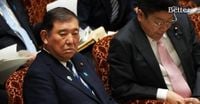In a striking shift in workplace dynamics, nearly half of Japan's workforce is embracing a trend known as "Quiet Quitting," which challenges the nation's traditional culture of relentless work. According to a recent survey by the job placement agency Mynavi, 45% of Japanese workers aged 20 to 59 identify as "Quiet Quitters," meaning they fulfill only their basic job requirements and refrain from taking on extra responsibilities or seeking promotions. This phenomenon reflects a growing desire among employees for a better work-life balance and a rejection of the long-standing ethos of working oneself to exhaustion, known as "karoshi," or death from overwork.
Akari Asahina, a researcher from Mynavi Career Research Lab, highlighted the significance of this trend, stating, "We’ve observed that Quiet Quitting is becoming the new normal." This shift, which gained traction after the term went viral on TikTok in 2022, resonates with many workers who are re-evaluating their job roles and prioritizing personal well-being over traditional career advancement.
Reasons for this trend are varied, with many employees expressing dissatisfaction with their current roles or feeling that their work does not align with their personal values. The survey revealed that over 70% of those who identify as Quiet Quitters intend to continue this approach, while 60% reported greater satisfaction with their lives as a result. This represents a significant cultural shift in a country known for its rigorous work ethic.
In a related context, Japan's Ministry of Health, Labor and Welfare is considering reforms that would make it easier for companies to dismiss employees, particularly in cases involving language and cultural differences. Katsunobu Kato, Japan's Minister of Health, Labor and Welfare, emphasized that companies are integral to the supply chain, suggesting that dismissals might become more commonplace as businesses adapt to changing workforce dynamics.
Kato noted, "It’s important to understand that language is a key part of the supply chain," indicating that the government is aware of the complexities involved in managing a diverse workforce. The potential easing of dismissal standards is intended to enhance flexibility within the labor market, yet it raises concerns about job security among workers.
The Yomiuri Shimbun, a leading Japanese news agency, reported that following Kato's comments, there is an expectation that stock prices and currency exchange rates will fluctuate, potentially making the U.S. dollar cheaper. This comes at a time when the Japanese government is under pressure to bolster its economy while navigating a delicate balance of maintaining strong international relationships.
Additionally, the number of reported cases of whooping cough in Japan has surged, with the Health Security Institute noting that 2,176 cases were recorded in just one week up until April 27, marking the highest weekly total since 2018. This increase, which represents a doubling of cases compared to the previous year, has raised alarms among health officials, particularly as it disproportionately affects infants and young children.
The rise in whooping cough cases has prompted the Japanese Pediatric Society to urge parents to ensure their children receive vaccinations promptly. This public health crisis underscores the need for vigilance in maintaining immunization schedules, especially in light of recent trends in workplace health and safety.
As Japan grapples with these interconnected issues—shifting workplace values, potential reforms in labor laws, and public health challenges—the landscape of work and life in the country is clearly evolving. Workers are increasingly advocating for their rights to a balanced lifestyle, while the government and businesses must adapt to these changing expectations.
This cultural shift, alongside the challenges posed by rising health concerns, illustrates a nation at a crossroads. The traditional ideals of dedication and sacrifice in the workplace are being questioned by a new generation that values personal fulfillment and well-being. As Japan moves forward, the implications of these changes will likely resonate through its economy and society for years to come.


